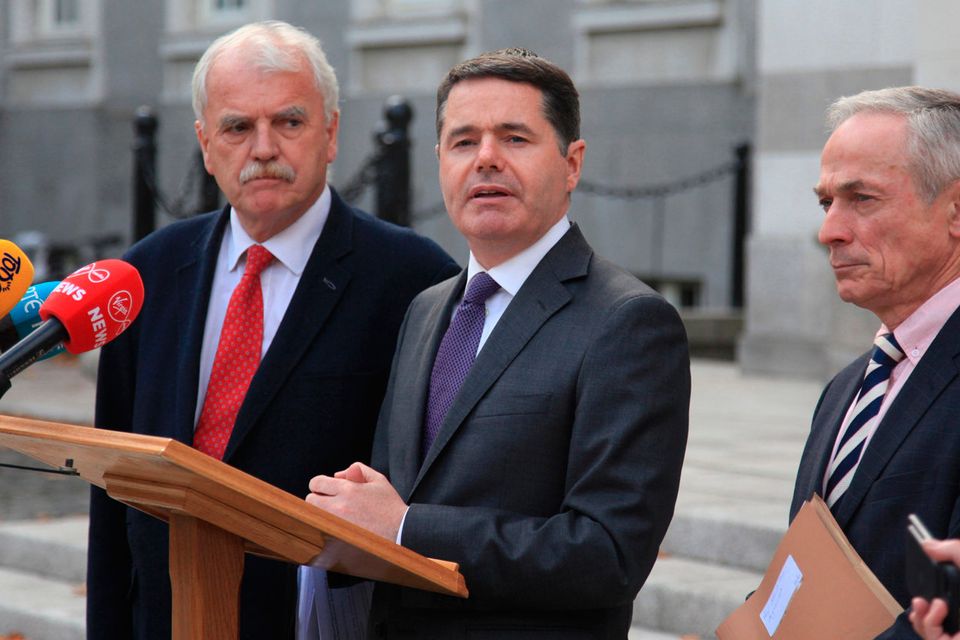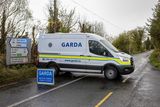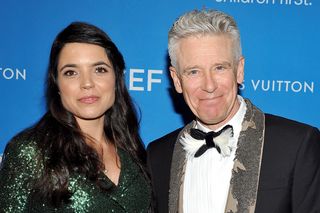Strike threat as public sector workers lash out at €3,300 deal without back pay
More than 60,000 public sector workers will benefit from changes to austerity-era cost-cutting measures
Minister for Finance and Public Expenditure and Reform, Paschal Donohoe along with Minister for Education, Richard Bruton and Minister of State for Disability Issues, Finian McGrath, hold a press conference on the new pay agreement on the new entrants' salary-scale issues. Photo: Garrett White / Collins Photo Agency
Pay rises worth €3,300 are on the way for more than 60,000 public sector workers - but it may not be enough to avoid strikes.
The increases kick in from next March for workers who were employed on lower pay rates over the last seven years under austerity-era cost-cutting measures.
But the €190m deal to end the two-tier pay system has not settled all grievances on the pay inequality front and teachers, doctors and nurses are unhappy.
The deal means those who have been on lower pay rates since 2011 will gradually catch up with their longer-serving colleagues - although it will take up to 2026 for some.
They will do this by leap-frogging up two or three increments on their pay scales to make up for starting their careers on lower pay rates than longer-serving staff.
But some unions are angry that the deal does not include any back payment to make up for the thousands of euro they lost since they were hired on pay rates that were 10pc lower than their colleagues'.
The three teacher unions previously have warned of the possibility of strike action if their demands are not met in full.
Outstanding issues for the teachers relate to a qualification allowance, generally known as the HDip allowance, worth €1,236 a year, and the fact that teachers no longer start at the third point of their payscale.
ASTI president Breda Lynch said members of the union would discuss industrial action shortly.
"We have to consider it," she said. "Our members are a very democratic organisation. We'll talk to our members and see where we go from here."
Teachers' Union of Ireland general secretary John MacGabhann said while the deal "represents further movement, it won't of itself deliver pay equality".
But the Irish National Teachers Organisation decided last night to ballot members on the package without any recommendation, and acknowledged they had made "significant progress".
The Irish Nurses and Midwives Organisation has warned its members will consider industrial action if they do not get a substantial pay offer from the Government by a deadline this week.
They want their pay to be on a par with professional staff including physiotherapists.
Nurses in specialist roles are already in line for a €20m deal, which was recommended by the Government's pay advisory body.
However, the two deals may not be enough to bring their members on board.
The Irish Medical Organisation warned it is consulting members on the potential for industrial action if the Government does not hold talks on a pay gap that will still exist between recruits and their colleagues, despite the deal.
It said recruits since 2012 will still be on pay rates that lag 30pc behind longer-serving staff. This is because consultants, unlike any other public servants, suffered a 30pc cut on top of the 10pc cut for new entrants.
It said pay rates for new entrants would be up to €50,000 a year lower for colleagues doing the same job.
However, Finance Minister Paschal Donohoe indicated the purse strings were closed and he would not be giving out further sweeteners.
"I've no plans to make any changes beyond what I'm announcing today," he said.
Mr Donohoe denied he was throwing money at public servants to win votes and said the deal was affordable and stretches to 2026.
He would not say if he believed it was in breach of the current pay deal which rules out implications for the "fiscal envelope" of the agreement.
The minister said he was adding €27m to next year's budget but had faced demands for the €190m to be paid in one year, and the restoration of allowances.
Mr Donohoe said the agreement followed complex and difficult discussions.
The 60,000 new entrant recruits to the public service since January 2011 includes over 16,000 teachers, nearly 5,000 Special Needs Assistants and almost 10,000 nurses.
Join the Irish Independent WhatsApp channel
Stay up to date with all the latest news















